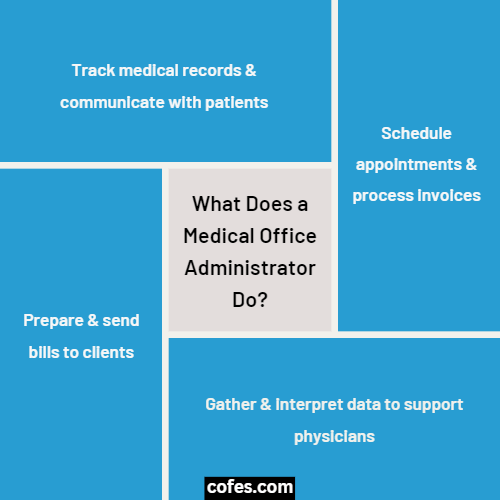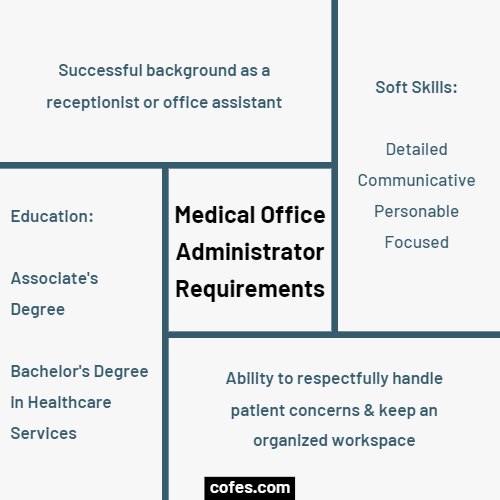Are you interested in healthcare?
Are you detail-oriented with strong communication skills?
A career as a medical office administrator may be the perfect fit for you.
In this position, employees often act as a liaison in numerous ways.
They liaise patient to physician, client to insurance, and administrative staff to medical staff.
Medical office administrators have wide-ranging duties, from scheduling to bill management.
Working as a medical office administrator is a rewarding career within a continuously growing industry.
Medical Office Administrator Job Information
| Official Job Title | Medical Office Administrator |
| Average Salary | $44,000 |
| Stress Level | Average |
| Work/ Life | High |
| Job Satisfaction | High |
| Career Advancement | Average-High |
Medical Office Administrator Job Description
What is a Medical Office Administrator?
A medical office administrator works in a variety of clinical settings.
Their overarching duties are communicating with patients, working with insurance companies, collecting data, and managing office supplies.
Some medical office administrators manage staff, making them additionally responsible for payroll.
What Does a Medical Office Administrator do on a Daily Basis?
A typical day for a medical office administrator includes the following:
- Keeping track of records
- Scheduling appointments
- Processing invoices
- Sending bills to clients
- Helping patients by answering questions
- Gathering or interpreting data to support a physician
Each day will look slightly different, but aspiring medical office administrators can anticipate these tasks happening most, if not all, of their working days.

Responsibilities, Duties & Roles of a Medical Office Administrator
Because the tasks required of medical office administrators often entail the management of money, it is essential to be detail-oriented and error-free.
Overseeing patient bills, insurance, and other invoices is a big responsibility that needs thorough and diligent attention.
Medical office administrators are also in front-facing positions.
They’re responsible for maintaining a friendly and professional demeanor when interacting with patients and other office stakeholders.
Medical Office Administrator Salary
Average Salary
The average salary for medical office administrators in the United States is $44,000 annually.
However, it is essential to note that this average greatly varies according to city or industry.
For instance, the average salary in the pharmaceutical industry is the highest, at $62,740.
The size of the medical office can also impact it.
Starting Salary
This number is challenging to pinpoint due to the varying pay rates across the United States.
That said, starting salaries for medical office administrators are around $31,500 annually.
Senior Salary
The average senior salary of medical office administrators is around $65,256 per year.
How to Become a Medical Office Administrator
The Entry Level: Certification, Training & Degree
People with no experience will commonly begin medical office administration careers as medical receptionists.
From there, they can work up to administrators managing entire medical offices or hospitals.
To start as a medical receptionist, an associate’s degree or certificate program may fit the bill.
To jump ahead, obtaining a bachelor’s degree in Health Administrative Services or another related area may help you land a higher-paying job upon graduation.

Other Skill Sets, Requirements & Qualifications
In addition to formal education, soft skills are crucial to success in a medical administrative position.
Sought-after abilities are strong verbal and written communication skills, the ability to advocate for patients, and a proven detail-oriented approach to all work.
Employers also look for technical skills, proficiency with Microsoft Office, experience with scheduling software, and knowledge of managing digital patient records or databases.
How Long Does it Take to Become a Medical Office Administrator?
If you want to obtain higher education in the field, landing an entry-level medical administration position will take 2-4 years.
Is it Hard to Become a Medical Office Administrator?
Typically, no.
Once you prove you have the capabilities necessary for the job, you should be well-positioned to market yourself and land a job.
The medical industry is essential to all citizens, so there is sustainable job availability industry-wide.
Medical Office Administrator Career Paths
The Medical Office Administrator Roadmap
The lowest entry-level position in a medical office is the receptionist.
From there, individuals level up to medical assistants.
After gaining experience, one can advance their career to becoming an office manager.
After several years, this role positions employees well for further promotion, where they can lead larger departments or even entire hospitals.
These high-level administrative positions come with extremely high salaries.
Projections for Growth in Medical Office Administration Jobs
Growth in this field is extremely promising.
The United States Bureau of Labor Statistics claims medical administrators’ and managers’ projections will grow 16% through 2031.
They also report that manager salaries in this area have grown to a potential $104,280 per year.
Now is a perfect time to seek out a career in medical administration.
In Summary: Is Medical Office Administration a Good Career?
A career in medical administration can be a fantastic career for those interested in healthcare.
If you like fast-paced environments and ranging responsibilities, this is an excellent career for you.
The projected growth in the field means numerous opportunities for advancement and increased pay.
Working Conditions
Can a Medical Office Administrator Work Remotely From Home?
Yes!
With the steady rise of telehealth, more medical administration jobs are moving online.
Some doctors’ “offices” are now fully remote, with no physical location!
Seeking a remote position in this industry is becoming more and more of a possibility.
How Many Hours Does a Medical Office Administrator Work?
Typically, medical office administrators work 40-hour work weeks.
The positions often come with health benefits and paid time off as well.
Can a Medical Office Administrator Work Part-Time?
It is more common to see entry-level positions fall into the part-time category, especially roles such as medical receptionist.
If you are starting out and looking for part-time work, this type of role could be a good solution.
That said, part-time work does not typically come with the same benefits as full-time work.
What are the Average Vacation Days of a Medical Office Administrator?
The average vacation days of a medical office administrator will depend on various factors: hours per week, position level, company policies, and so on.
The average vacation package for administrative workers in the United States starts at seven days and increases over time.
Alternative Careers & Similar Jobs to a Medical Office Administrator
- Office Manager
- Research Assistant
- Public Relationship Manager
- Executive Assistant
- Administrative Manager
- Medical Researcher
- Medical Records Technician
- Medical And Health Service Manager
- Medical Transcriptionist
- Case Manager
- Director of Nursing
Medical Office Administrator Resume Tips
Four key tips for creating a medical administration resume are highlighting relevant experience, showing applicable skills, quantifying your achievements, and ensuring precise formatting from top to bottom.
A top priority of employers in medical administration is to seek out employees with the required technical abilities and soft skills.
Be sure to include all work and volunteering that proves your knowledge of Microsoft Office, scheduling platforms, and patient databases and your ability to communicate well.
In sum, be sure also to include the basics: name, contact information, LinkedIn profile, education, experience, certifications, and additional skills.
Medical Office Administrator Interview Questions
Below are a few potential interview questions that recruiters may ask medical administration candidates.
We also define the purpose of the question to help you prepare for your first interview.
Q1: What is it like working on your own?
Why it works: Asking this question during an interview can examine personalities to determine if the candidate embodies optimism and high expectations.
Q2: What type of people do you work with most effectively?
Why it works: In opposition to the previous question, this question examines an individual’s ability to collaborate with others and in what capacity.
Directors of Photography lead large teams, so they must be able to work with others effectively.
Q3: What experience do you have working with insurance companies on behalf of patients?
Why it works: Asking this question allows candidates to express the working knowledge necessary for the job.
When listening to someone’s answer or brainstorming your answer, keep an ear out for the use of proper technical terms and industry jargon.
Using adequate terminology can show candidates have the skills they claim.
Jobs Related to Medical Office Administrators
Below is a list of jobs related to medical office administration, emerging in the industry, or falling under the industry’s umbrella at large.
- Medical Receptionist
- Medical Assistant
- Medical Transcriptionist
- Medical Office Manager
- Hospital Administrator
- Medical Administrative Assistant
- Nursing Home Manager
- Diagnostic and Laboratory Manager
- Wellness Program Officer
- Healthcare Writer
- Biomedical Engineer Manager
- Health Insurance Specialist
- Social Welfare Administrator
- Social Media Director for Clinical Settings
- Pharmaceutical Project Manager
- Healthcare Brand Manager
- Healthcare Data Scientist
- Healthcare Information Administrator
- Healthcare Policy Specialist
- Healthcare Consultant
